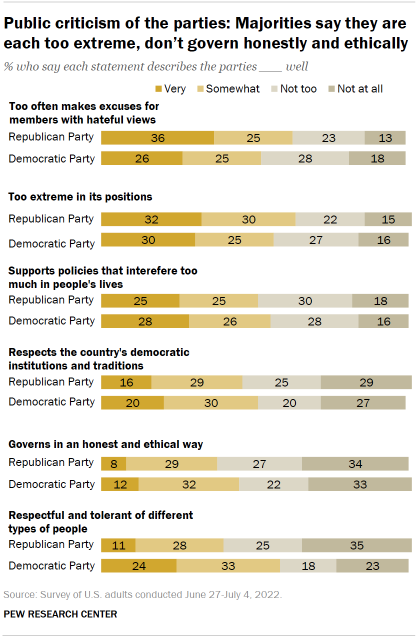
Slightly more than half of U.S. adults (55%) say the Democratic Party is too extreme in its positions, while a somewhat larger share (61%) say the same about the Republican Party. Similarly, while 61% say the phrase “too often makes excuses for party members with hateful views” describes the Republican Party very or somewhat well, 51% say this about the Democratic Party.
Americans are slightly more likely to say the Democratic Party supports policies that interfere too much in people’s lives than to describe the Republican Party this way (54% vs. 50%).
The Democratic Party holds a sizable advantage with the public on being seen as “respectful and tolerant of different types of people.” Nearly six-in-ten (57%) say this describes the Democratic Party at least somewhat well; 38% say the same for the GOP.
And while the Democratic Party also holds modest advantages on respecting the country’s democratic institutions and traditions and on governing honestly and ethically, neither party rates highly among the public on these measures. While 45% characterize the Republican Party as respecting the country’s democratic institutions, 51% say the same about the Democratic Party. And just 37% say the phrase “governs in an honest and ethical way” describes the Republican Party at least somewhat well, with 43% saying this description applies to Democrats.
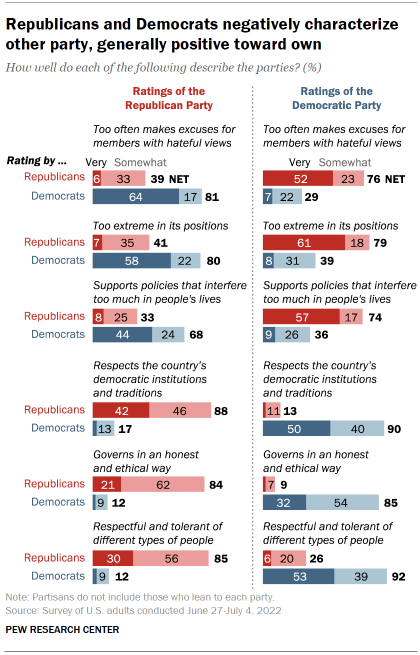
Partisans overwhelmingly offer criticisms of the other party while evaluating their own in generally positive terms.
For example, 84% of Republican identifiers say “governs in an honest and ethical way” describes the Republican Party at least somewhat well, while 85% of those who identify as Democrats say the same about the Democratic Party. Conversely, just 9% of Republicans say the Democratic Party governs in an honest and ethical way, and only 12% of Democrats say this about the GOP.
Partisans are similarly positive toward their party and negative toward the other party on respecting the country’s democratic institutions.
However, while large shares in both parties say their own party is respectful and tolerant of different types of people, about a quarter of Republicans describe the Democratic Party this way; just 12% of Democrats view the GOP as respectful and tolerant of different types of people.
Partisans are somewhat critical of their own party on some traits. About four-in-ten in both parties say that “too extreme” describes their own party at least somewhat well (41% of Republicans, 39% of Democrats), while roughly a third in both parties say their party supports policies that interfere too much in people’s lives (33% of Republicans, 36% of Democrats). About four-in-ten Republicans (39%) characterize their own party as too often making excuses for members hateful views, while about three-in-ten Democrats (29%) say this about their party.
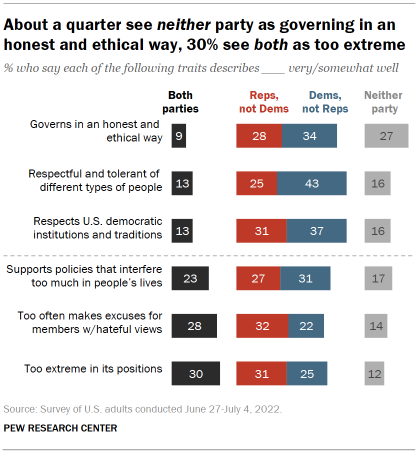
Overall, about a quarter of adults (27%) say neither party governs honestly and ethically, while 30% say both parties are too extreme in their positions. Nearly as many (28%) say both too often make excuses for party members who have hateful views.
While few Americans say both of the parties are described well as respectful and tolerant (13%) or as respecting the country’s democratic institutions (also 13%), similar shares (16% for each) say these descriptions apply to neither of the parties (in both cases, the public is more likely to say these terms apply to the Democratic Party, but not the Republican Party, than to say the reverse).
About half of Republicans like leaders who contend Trump won 2020 election
Among Republicans, strength of partisanship is closely associated with feelings about Donald Trump and his unsupported assertion that he was the legitimate winner of the 2020 presidential election.
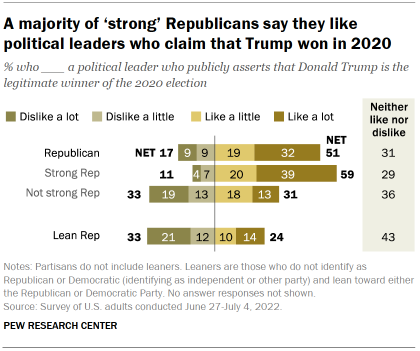
Overall, 51% of Republicans say they like political leaders who assert this, compared with 17% who dislike such leaders. About a third of Republicans (31%) say they neither like nor dislike leaders who assert that Trump was the legitimate winner.
Nearly six-in-ten Republicans who identify strongly with the Republican Party (59%) say they like political leaders who assert that Trump won, including 39% who like such leaders a lot. Just 11% of strong Republicans dislike leaders who assert Trump was the winner in 2020, while 29% say they neither like nor dislike leaders who assert this.
By contrast, Republicans who identify with the Republican Party but not as strongly are divided in views of political leaders who assert that Trump was the legitimate winner of the election. While 31% say they like such leaders, about as many (33%) do not; another 36% say they neither like nor dislike leaders who assert that Trump was the winner.
Strong Republicans represent a much larger share of Republicans than those who identify with the party but not as strongly; 70% of all Republicans say they strongly identify with the Republican Party.
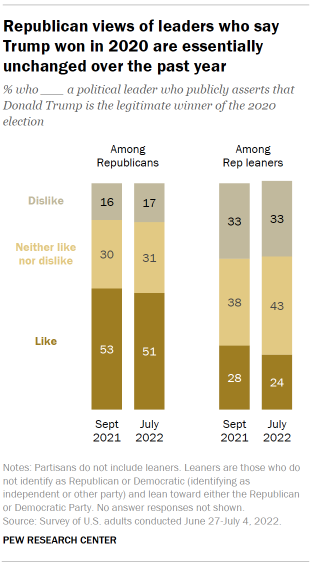
Republican-leaning independents, like those who identify as Republicans but not strongly, have mixed views of leaders who claim that Trump was the rightful election winner. A third of independents who lean toward the Republican Party dislike leaders who assert Trump was the winner of the most recent presidential election, compared with 24% who like leaders who assert this. The largest share of Republican leaners – 43% – say they neither like nor dislike leaders who assert that Trump won in 2020.
The share of Republicans who say they like a political leader who publicly asserts that Trump is the legitimate winner of the 2020 election (51%) is essentially unchanged since September 2021, when 53% of Republicans said this.
The share of Republicans who say they like a leader who asserts this a lot is down somewhat over the past year. About a third (32%) of Republicans say they like a leader who asserts this a lot, compared with 38% in 2021; the share who like a leader who asserts this a little has increased slightly over the same period, from 15% to 19%.
Among Republican leaners, the share who like leaders who assert that Trump won in 2020 has decreased by 4 percentage points since 2021. The share of leaners who dislike leaders who assert this is unchanged at 33%.
Republicans without college degrees are more likely than those with four-year degrees to say they like political leaders who assert that Trump was the legitimate winner in 2020. A majority of Republicans without four-year degrees (56%) like political leaders who assert this, including 37% who like such leaders a lot. Just 13% of Republicans without degrees have negative views of political leaders who assert Trump won, while 30% neither like nor dislike leaders who assert this.
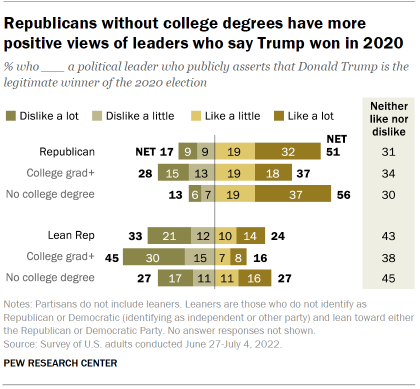
Among Republican college graduates, more have a positive view than a negative view of political leaders who assert that Trump legitimately won the last election (37% like these leaders vs. 28% who dislike them). About a third (34%) of Republican college graduates neither like nor dislike leaders who assert that Trump was the legitimate winner.
While Republican-leaning independents are less positive toward leaders who assert that Trump won in 2020 than Republican identifiers overall, there is also an educational divide within this group. Republican leaners without college degrees are 11 percentage points more likely to say they like leaders who assert Trump won than those with college degrees (27% vs. 16%). And leaners with college degrees are 18 points more likely than those without degrees to say they dislike leaders who assert this (45% vs. 27%).
Views of political leaders’ approach to the other party
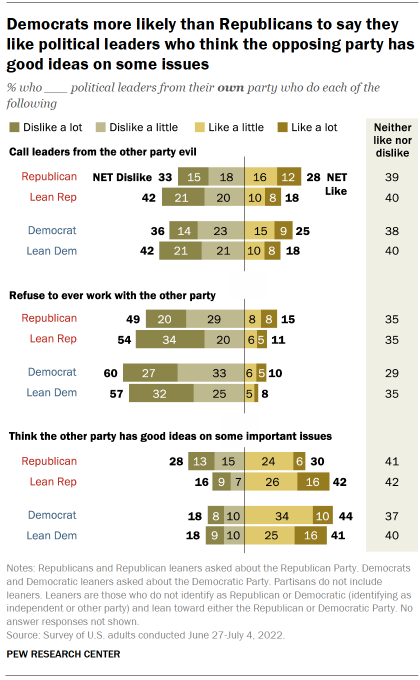
People who identify with each party are somewhat more likely to say they dislike leaders from their own party who call leaders of the other party “evil” than they are to say they like leaders who do this. Roughly a quarter of Republicans (28%) and Democrats (25%) say they like such leaders, while somewhat more (33% of Republicans and 36% of Democrats) say they dislike leaders of their own party who describe opponents as evil. About four-in-ten in each party say they neither like nor dislike such leaders (39% of Republicans, 38% of Democrats).
Compared with those who identify with a party, independents who lean toward each party have more negative views of leaders who call those in the other party evil. Identical shares of Republican leaners and Democratic leaners say they like (18%) and dislike (42%) political leaders from their party who call leaders from the opposing party evil.
Among both Democrats and Republicans, larger shares say they dislike leaders from their party who refuse to ever work with leaders from the other party than say they like them. However, Democrats are more likely to have negative views of such leaders (60% dislike) than Republicans are (49%). Only small shares in each party (15% of Republicans, 10% of Democrats) say they like leaders of their own party who rule out working with the opposition.
Democrats also have more positive views of leaders from their own party who think the other party has good ideas on some issues. Democrats are more than twice as likely to say they like a Democratic leader who thinks Republicans have good ideas on some important issues as they are to say they dislike this type of Democratic leader (44% vs. 18%). Among Republicans, nearly identical shares like (30%) and dislike (28%) Republican leaders who think Democrats have good ideas on some important issues.
Similar shares of Republican leaners (42%) and Democratic leaners (41%) say they like leaders from the party they lean toward who say that the other party has good ideas on some issues.
Does support for a political party reflect on a person’s character?
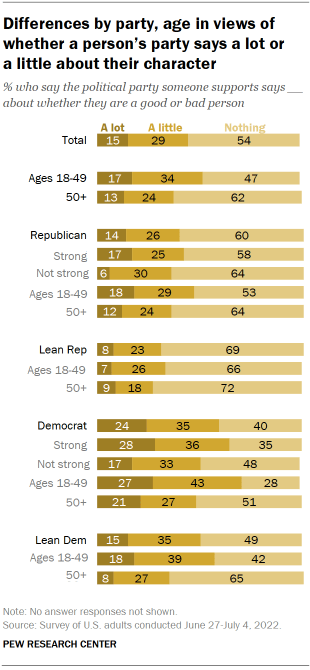
While large shares of Republicans and Democrats have negative impressions of those in the other party, a majority of all Americans (54%) say that, in general, the political party someone supports does not say anything about whether they are a good or bad person. Nearly three-in-ten (29%) say one’s political party says a little about whether they are a good or bad person, and 15% say it says a lot.
Democrats are more likely than Republicans to say the party that someone supports says a lot or a little about whether they are a good or bad person (59% of Democrats vs. 40% of Republicans).
There also are age differences in these views: 52% of adults younger than 50 say support for a party says at least a little about someone’s character compared with 37% of those 50 and older.
In both parties, those who are younger than 50 are more likely than those who are older to say that the party someone supports says something about their character. However, these differences are much more pronounced among Democrats.
Seven-in-ten Democrats ages 18 to 49 say a person’s partisanship says something about whether they are a good person compared with about half of older Democrats (48%).
Among Republicans, 47% of those younger than 50 and 36% of those 50 and older say the party someone supports says something about whether they are a good person.



